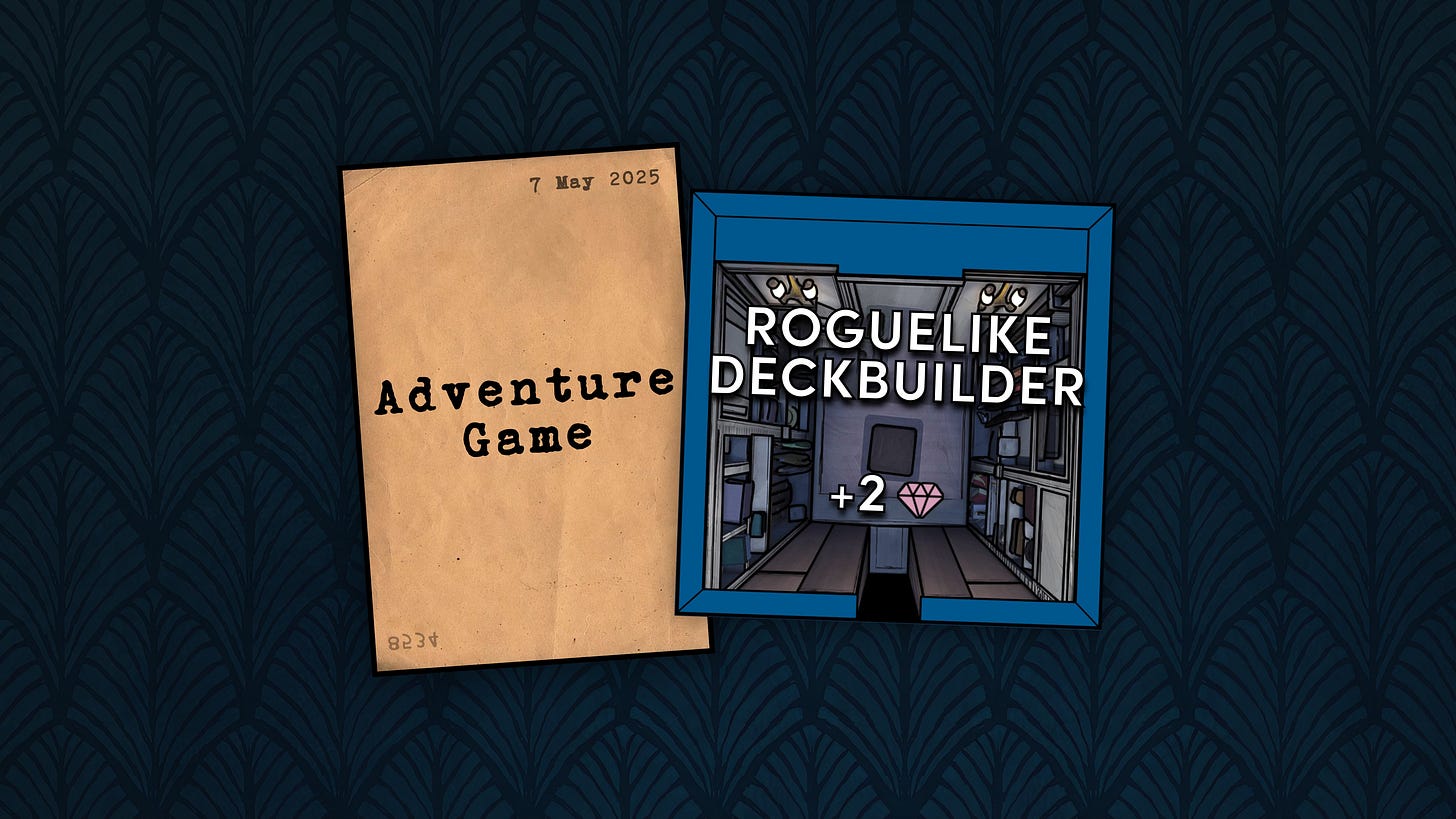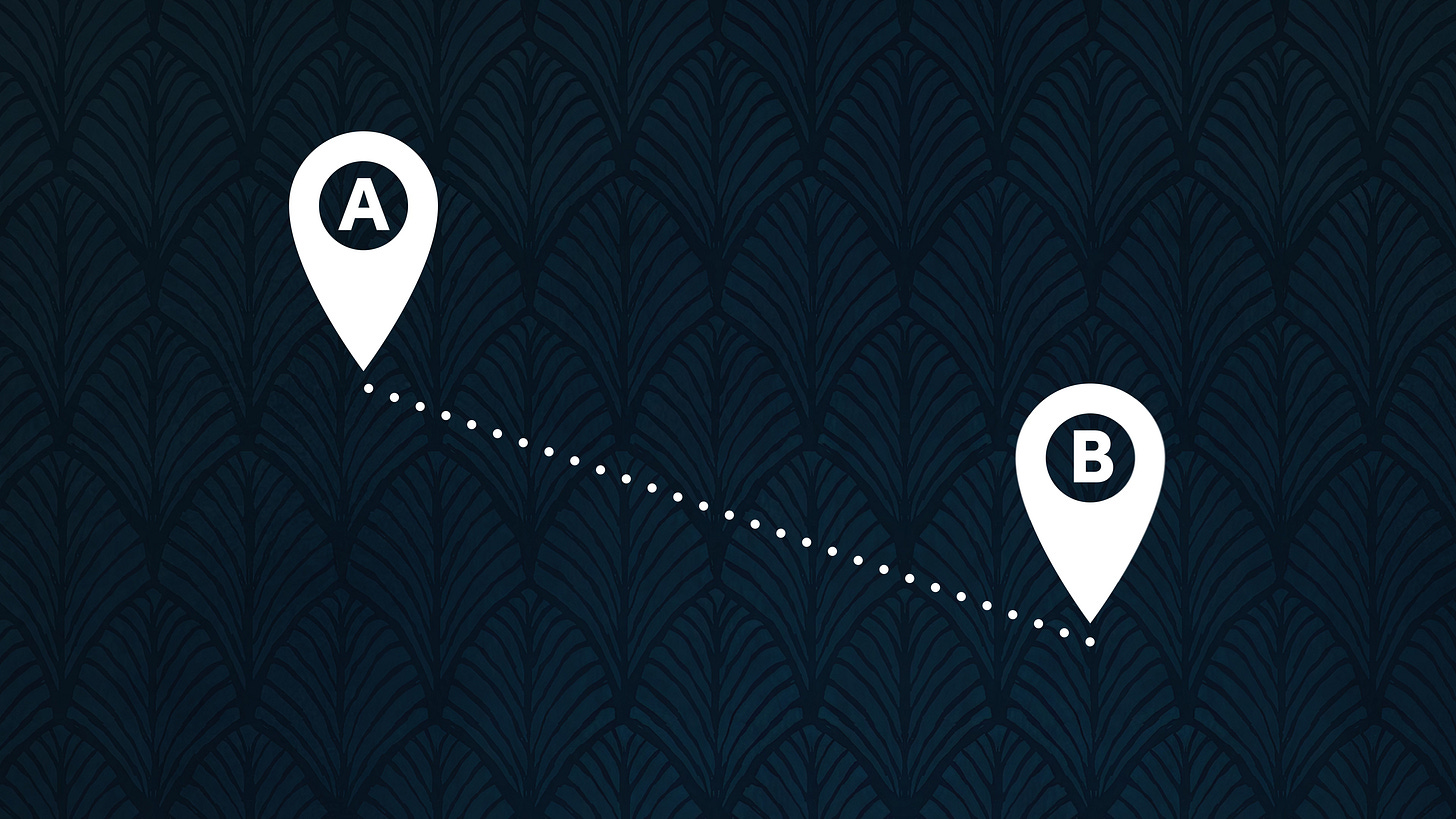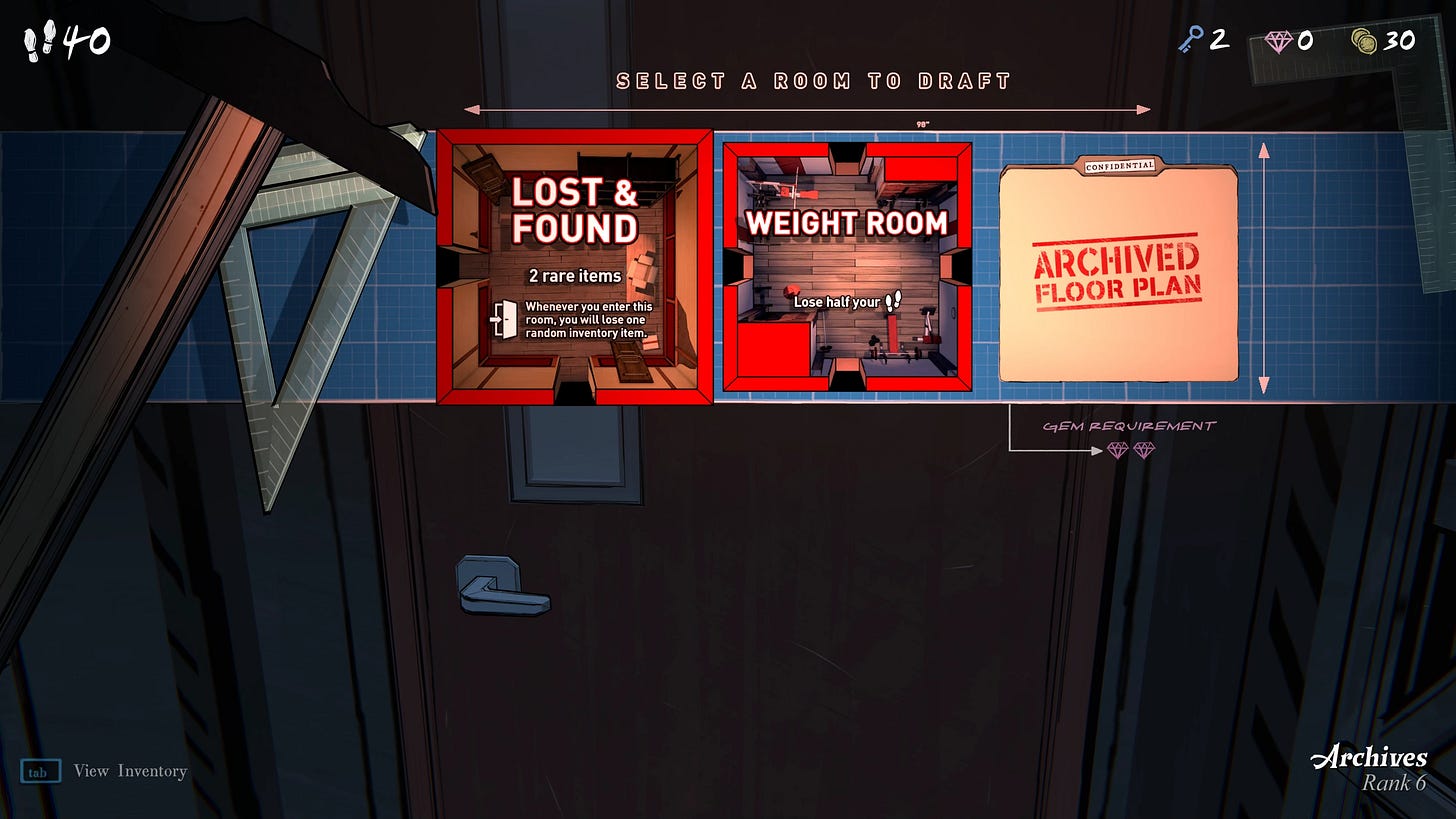Hey! Yo. What's up? Mark here.
Sorry for the radio silence. Right now I am deep in the final stages of developing my new game.
But... I just had to pop back onto Substack for a spell to talk about Blue Prince.
Because it is a totally fascinating game to talk about - both in terms of its design, and how people have reacted to it.
The Concept
Right. Let's speedrun through the game's concept.
You've inherited a humongous house from your great uncle. But you only get to keep it if you can find the mansion's secret 46th room.
So it's a game of mysteries and treasure hunts. A game about clues and padlocks and keys and riddles and patterns and codes. Just the sorta thing I love to sink my teeth into.
But! There's a twist. You see, the house's layout is not predetermined - instead it's created by laying down tiles. You essentially build the house, room by room, making strategic decisions every time you open a door.
So you're carefully juggling resources like keys, gems, and stamina - and if you build your way into a corner you'll have to call it a day. And tomorrow... the house's layout will be completely reset and you'll have to start from scratch.
So it's a curious and truly unconventional mix of genres. Part adventure game, part roguelike deckbuilder.
And it's this second half that is the source of the game's fiercest criticism. Because if you look at user reviews you will see a lot of people who are angry at the game's RNG. Or - in other words - the way it uses random generation.
Now, sometimes... the complaint is simply that the RNG is being a bit cruel. Perhaps the game gives you a crappy selection of rooms, not enough resources, and too many dead ends - all of which means that a day just comes to a crashing, unsatisfying end. And, sure, that can happen sometimes. And it's not much fun.
But - more importantly - there's criticism for how the random side of the game actually gets in the way of the puzzle solving side of the equation. How the two sides don't really mix all that cleanly.
So what's the issue?
The Problem
Well... if we look on the puzzle solving side of things, every game in this genre - from Myst to Animal Well - can be boiled down to.... essentially... joining the dots.
You find a clue in one part of the world, and then you input it somewhere else.
You find a code, you put it in a safe. You find a password, you put it in a computer. You find A, you apply it to B.
Of course - this will be complicated in all sorts of ways. You've got to make the logical connection between the dots. Or combine multiple clues. Or follow a string of interconnected hints. Or decode an entire language or whatever - but the point still stands. It's join the dots. A to B.
But in Blue Prince... the randomness means that you can have a clue, but not actually have access to the place where you need to input it! You might get a safe code... but the safe won't appear for the next three or four runs. In other words: you've got A, but your house doesn't have a B. Or the other way around.
And it's sometimes even more fiddly than that.
So - without going into spoilers - to get one important piece of information you need to have drafted two specific rooms, and be holding a specific item. And another puzzle requires two rooms to be drafted in close proximity to each other. And so it can be pretty frustrating when those don't all appear in the same draft.
But remember - this also extends to stuff you merely have a hunch or a theory about. You know, maybe those things are connected? Maybe this is the right code to the safe? And that's a big part of puzzle games: testing theories. Does A connect to B? Let's find out.
But - again - testing each one of those theories is reliant on a specific combination of rooms popping up.
And so you can essentially have the solution to a puzzle - but cannot actually input it unless the stars align, the dice roll in your favour, and the right rooms pop up in the right locations.
And I certainly felt this myself! There were plenty of times - like, measured in hours - where I knew what I needed to do - but was constantly blocked, delayed, or frustrated by a bad set of rolls. Or in other words - where the hell is the pump room?!
Or in other words - where the hell is the pump room?!
This random flavour also means that it's really hard to get fixated on a single puzzle. You can't just follow a single thread or go down one specific rabbit hole because there's no guarantee that the game will give you the rooms you need for that!
Instead, you need to be able to pivot and adapt to what the house gives you each day. You got the secret garden key? Okay, let's try and figure out how to use that. Drafted the bookshop? Let's focus on making loads of money so we can buy new books. That sort of thing.
And that - to me - was a hard pill to swallow. I'm very methodical with puzzle games: I like to focus on solving one thing at a time. And some of my favourite adventure game moments are all about that: chasing the quantum moon in Outer Wilds, or following the Golden Path in Tunic.
In fact, I find it pretty overwhelming to juggle lots of loose threads, theories, and hunches. I get lost in the weeds. And Blue Prince has a LOT to juggle. Multiple storylines, a huge family tree, dates, codes, numbers, languages, paintings, chess pieces, locked doors, and seeming dead ends.
So I found it tough to get knocked off a thread. And sometimes would just keep re-rolling until I got the rooms I needed for my current investigation.
Why Random?
Okay. So - I think that defines the problem.
Adventures games rely on players making connections between different elements. But when you add in randomness, you can make it tedious or even impossible for the correct elements to even show up. That makes it more annoying to solve puzzles, and breaks the flow of sinking your teeth into a good conundrum.
And so... I guess the question is, if these two sides of the game are in such contention, why does Blue Prince have randomness in the first place? Why did developer Dogubomb pair a Myst-like game with one about shuffling a deck of tiles? And would the game be better if it was just a fixed house full of secrets?
Well, looking at interviews with designer Tonda Ros, and just from my own time playing the game, I think I can highlight a few reasons why the developers chose to have randomness be part of the game.
Okay, so one - the game is simply more novel. There are already plenty of games about finding secrets in mansions. But there aren't many games about drafting the mansion yourself, tile by tile. That's usually a board game thing.
Two - it adds to the sense of mystery and intrigue. The sheer number of possible rooms and layouts creates a massive possibility space. Stumble upon a secret and it feels like a genuine discovery - especially because you may not see this room again for ages.
Three - it adds another dimension to the puzzle solving. Having to get specific rooms near each other is a puzzle in of itself. It's a way of proving knowledge to the game. Just like how Outer Wilds can ask you to be at a specific location... at a specific TIME during the loop, Blue Prince can ask you to manipulate the house in a very specific way in order to solve a puzzle.
Four - it gives the game an exciting final challenge in order to solve the overarching puzzle to open door 46. It's like doing that final loop in The Forgotten City or that epic final run in Prey: Mooncrash. You gotta nail everything in a single run in order to finish Blue Prince.
And five - it gets rid of dead ends and brick walls. in a lot of adventure games you can just find yourself stumbling around the same environment over and over again, looking for some tiny thing you missed, or some connection you've yet to make. But in Blue Prince? Just start a new day and you've got a whole new set of things to check out.
Possible Fixes
So - okay. If we were to try and fix this game... and as always - when I say fix - it's just an interesting design chat, not a dig at the game or the designer - but if we were to “fix” this game, we'd have to leave the randomness intact. We can't just strip that part of the game out and turn it into yet another digital escape room.
So maybe we can keep the randomness... but tweak things a little to make it more palatable to puzzle game fans. Here's what I've come up with.
So - for one thing, Blue Prince has a lot of stuff to keep track of. An absolute metric butt load. There are multi-page letters, entire books, there are paintings and photos. And you need to store almost all of it because one, you've got to juggle lots of different puzzles and swap between them based on what rooms come up.
And two - you dunno when you're gonna see this room again, so don't count on being able to come back here for a recap.
The current solution is, ultimately, lots of notes and - unless you're extremely patient - lots of photographs or screenshots. And I'm totally fine with taking notes - I love a good video game note! But this is a totally overwhelming number of notes, so some in-game reference system would have been nice - even if just for storing a collection of written documents like books and notes. Or an in-game camera.
Solution two is to give the player more opportunities to change the drafting pool, so you can make certain rooms more likely. Let players game the RNG to focus on making specific runs happen.
Now, I'll admit, there is a little bit of this in the game as it stands. There are ways to change the rarity of a room. You can find various ways to re-roll layouts. You can force specific colours of room. And you can cause changes in the next day's pool. But - it's still surprisingly limited.
You can't remove rooms from the deck - a key part of deck-building games. And there are limited ways to increase the likelihood of a very specific room appearing.
Another possible solution is to simply change the way the game communicates things.
For instance - it's kind of weird that Blue Prince tells you exactly how many days you've been in the house. This can add an unnecessary sense of time pressure - like, you need to hurry up and get to room 46. It's been a month already, are you serious?! And this lingering tally can put a real emphasis on quote unquote wasted runs as they start to add up.
But - in realty - there's no limit to how long you can take. It doesn't matter if you find the antechamber on day one or day one hundred. And it's perfectly fine to skip a few days if the RNG isn't working out. So why is your day count so front-loaded? Roguelikes don't normally do this.
And finally - I think it could have been good to split the goal up a bit more.
As discussed, Blue Prince is a game where you can't get fixated on a single puzzle. And yet, the game presents a very explicit and definitive goal: get to, and unlock the antechamber. And sure - there are lots of different routes and ways to do it, but the goal is very singular. Get here.
But if the overarching goal of the game was more granular. Say... to unlock eight safes. Then it would hammer home the idea that you should be juggling lots of different puzzles. And that you have lots of goals to be going for simultaneously. I dunno, perhaps that would work.
Ultimately.... this is all pretty academic. Blue Prince is a great game, full of mystery, surprise, excitement, and satisfying reveals. And it has received incredible review scores from the press.
But it's not free of frustration. It is a game of dead ends, wasted trips, unlucky rolls, and repetitive treks.
And from my own experience - I've gotten to room 46 and enjoyed that experience, but I don't really want to delve into the massive end game simply because I know that will mean hours and hours of time just spent wrangling with RNG.
The game doesn't really respect my time and - like I said - I'm trying to finish a video game right now.
See you soon




